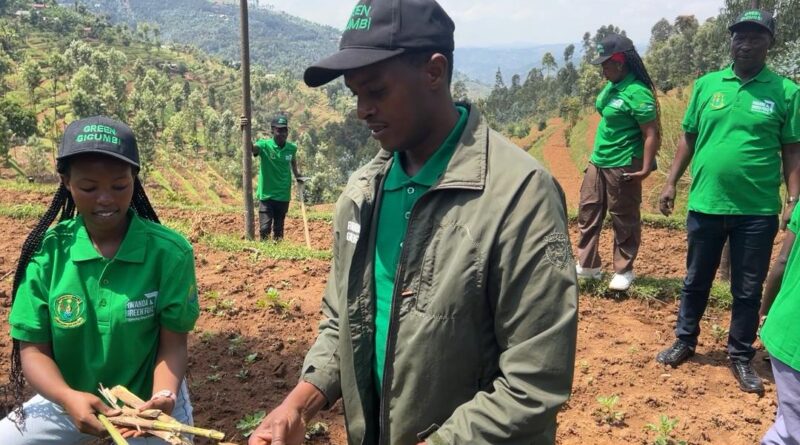Nappier grasses planted in Byumba to protect soil and fight erosion
The Executive Secretary of Byumba Sector, Theoneste Ngezahumuremyi, said that the area where trees were planted had previously been developed with radical terraces during 2013–2014. However, the soil had started to erode again, causing significant losses to farmers’ crops.
He added that the newly planted trees include fruit species intercropped with food crops to help combat malnutrition. In addition, nappier grass (urubingo) was planted to stabilize the soil, prevent erosion, and serve as fodder for livestock, which in turn provides manure to improve crop yields.
The Green Gicumbi Project, operating in nine sectors of Gicumbi District, is known for focusing on environmental conservation and tackling climate change, particularly in steep areas. The project also prioritizes the well-being of communities previously living in high-risk zones by relocating them to safer areas.
On September 26, 2025, a special community service (Umuganda) involved youth working in agriculture and livestock farming, who planted nappier grass, a species known for protecting soil, while also feeding livestock and enriching farmland with manure.
The nappier grass was planted across 40 hectares of radical terraces.
Kagenza Jean Marie Vianney, Project Coordinator of Green Gicumbi, said the initiative engaged youth in planting nappier grass in Gacurabwenge Cell, Byumba Sector, and also assisted farmers in planting fruit trees intercropped with food crops to help fight malnutrition.
He said: “This nappier grass will help us protect our soil. We must work together to prevent erosion because our land is as valuable as gold. By cooperating, we can overcome the impacts of climate change.”
Some of the youth who participated said that besides planting on the day of the special Umuganda, they will return to monitor the growth of the nappier grass, intervening if any problems arise to ensure the activity produces tangible results.
Kayishema Claude, one of the participants, said: “We have been trained on the importance of environmental conservation—planting trees, fighting erosion, and digging anti-erosion ditches to combat climate change. This is an important contribution in these times. We will continue to offer our energy wherever the nation needs us, and we are ready to work hand in hand with you.”
Gicumbi District is known for its steep hills and slopes across various sectors, and considerable effort has been invested in initiatives to tackle climate change.

